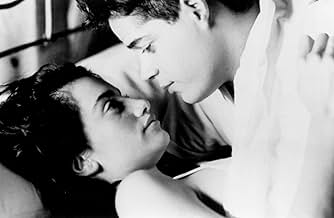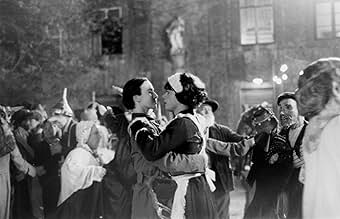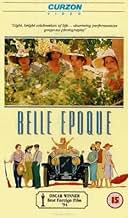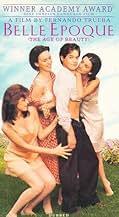VALUTAZIONE IMDb
7,1/10
11.892
LA TUA VALUTAZIONE
Nel 1931, un disertore militare spagnolo si ritrova in una fattoria solitaria fino a quando le quattro figlie del contadino vengono a visitare e il disertore si innamora di tutte.Nel 1931, un disertore militare spagnolo si ritrova in una fattoria solitaria fino a quando le quattro figlie del contadino vengono a visitare e il disertore si innamora di tutte.Nel 1931, un disertore militare spagnolo si ritrova in una fattoria solitaria fino a quando le quattro figlie del contadino vengono a visitare e il disertore si innamora di tutte.
- Regia
- Sceneggiatura
- Star
- Vincitore di 1 Oscar
- 25 vittorie e 15 candidature totali
Joan Potau
- Paco
- (as Juan Potau)
Recensioni in evidenza
Belle Epoque is a light, wistful romantic comedy, easy to watch, and easier to love. It is set in glorious pre-Franco Spain and is as beautifully filmed as it is written and acted.
The story entails (in a nutshell) a young army deserter who befriends an older man who is an artist and a self-proclaimed anarchist. The old man has four beautiful daughters and film carries you along as our young hero falls in love with each in order.
Belle Epoque is one of those rare gems that does not stray from its purpose - to be a celebration of love and romance and comic tale of a young soldier controlled by his libido. No violence, car chase scenes, drippy pre-packaged morality plays - just plain fun.
If you have not tried watching a sub-titled movie or have had little exposure to foreign films, start here. Belle Epoque is the best film I have seen out of Spain and an all-time personal favourite.
***1/2 out of ****.
The story entails (in a nutshell) a young army deserter who befriends an older man who is an artist and a self-proclaimed anarchist. The old man has four beautiful daughters and film carries you along as our young hero falls in love with each in order.
Belle Epoque is one of those rare gems that does not stray from its purpose - to be a celebration of love and romance and comic tale of a young soldier controlled by his libido. No violence, car chase scenes, drippy pre-packaged morality plays - just plain fun.
If you have not tried watching a sub-titled movie or have had little exposure to foreign films, start here. Belle Epoque is the best film I have seen out of Spain and an all-time personal favourite.
***1/2 out of ****.
8=G=
"Belle Epoque" is a light-hearted comedy romp which tells of the goings-on at a Spanish villa (circa 1931) involving a patriarch, his four beautiful and amorous daughters, and a wayward young man who can't say "no". Fanciful, warm, fun, and sexy, this Oscar winning film flows like honey as it aims for the heart, not the crotch or head, and hits the mark. Most likely to be appreciated by more seasoned viewers with an interest in Europics. (A-)
Note - This film has considerable dialogue making for significant subtitle reading for non-Spanish speakers.
Note - This film has considerable dialogue making for significant subtitle reading for non-Spanish speakers.
Belle Epoque has many layers. At it's core is a romance which is surrounded and disguised by a classic sex farce that is itself enveloped by a philosophical tale all wrapped up in a bittersweet historical setting. Spain is, as throughout it's history, in a political struggle. In this case, a battle between the dying monarchy and the emergent republic which is,as these things go, a mild one leaving most Spaniards to enjoy their lives during this "Belle Epoque". Those familiar with it's history know that this is the short calm before the storm of the Spanish Civil War in which the Republic is replaced by the Fascist dictatorship of Franco through a bloody war. My favorite setpiece is the dance where Violeta wears Fernando's uniform and dresses him in a ball gown and wig; the rest must be seen to be believed! A lovely film! And why the devil isn't it on DVD!?
Comical (farce at times), deeply human movie about an army deserter who meets up with a kindly, old, artistic gent who offers him refuge. The deserter is packed up and ready to go, until the artist's four beautiful daughters arrive. This sets in motion a plot that will keep you laughing, dialogue that will keep you thinking and characters that will keep you entertained. The humor is not forced and the chuckle is at life's absurdities, politics, most of all, human nature. Momma's entrance into the story is unique and melodic, to say the least. The movie is kind of kooky and not a by-the-numbers flick, and a satisfying watch. Sidebar: It did get the Oscar nod for Best Foreign Film.
This awesome film has a simple plot : A man , four women and a lot of romance . It deals with a Spanish soldier named Fernando (Jorge Sanz) deserts from the army in 1931, at the beginning of Spanish Republic , a time of optimism and promise and previous Civil War (1936-1939) . Fernando flees only to find himself detained by a pair of local Guardia Civil . The hearty young boy and main character, well portrayed by Jorge Sanz (still one of Spain's most promising young actors), breaks outs and soon is befriended a lonely ,elderly man called Manolo (Fernando Fernan Gomez) in a little village . Problems arise when the Manolo's four daughters (Penelope Cruz , Miriam Diaz Aroca , Maribel Verdu , Ariadna Gil) come to visit their daddy and the soldier quickly enchanted falls in love with each of them . Fernando likes all of them and they like him , so he must decide which one to love , or Rocio, Violeta, Clara and Luz .
Earthy comedy with historical and romantic elements ; including enjoyable performances , adequate set design and delightfully shot . ¨Belle Epoque" , ¨The age of beauty¨ results to be other of the innumerable stories to deal with youthful love , being developed in mirth , lively and vital style . An agreeable story in which an ex-soldier escapes and discovers the opposite sex on the way , it is plenty of amusing moments , moving feelings and fun finale . It is a light , wistful romantic comedy , easy to watch , and easier to love . A very pleasant romantic comedy plenty of humor , emotion , sensitive scenes and mayhem . "Belle Epoque" is Trueba's return to top form, with an intelligent and engaging script which uses amusing situations to give us a good movie in a high sense and intimate sensitivity and that kept me entertained for the almost two hours of duration . It is well set and is as marvelously filmed as it is written and acted . This is one of those rare gems that does not stray from its purpose - to be a celebration of love and romance and humorous tale of a young boy controlled by his libido . Oscarized director Fernando Trueba , also writes the interesting script along with prestigious screenwriters as Jose Luis Garcia Sanchez and Rafael Azcona , Luis Garcia Berlanga's ordinary . Filmed in his usual formal and luxurious style , without leaving a trace the joyful themes , in terms of dramatic and narrative excitement . The film is light and never somber, no small accomplishment from Fernando Trueba and his team . Very good secondary cast formed by Spanish familiar faces such as Gabino Diego , Agustin Gonzalez , Maria Galiana , Juan Jose Otegui , Mary Carmen Ramirez , Chus Lampreave : Almodovar's usual and the French Michel Galabru . Colorful and evocative cinematography by Jose Luis Alcaine , one of the best Spanish cameramen . Gorgeous exteriors filmed in Portugal ; Fernando Trueba shot the movie in Portugal for two main reasons : 1) he couldn't find any place similar to what he had in mind in Spain and 2) the use of that Portuguese location allowed him to empathize the tone of fable the story required . Jolly as well as sensitive musical score by Antoine Duhamel , including Non-Original music by Pablo Sorozábal from opera "La Taberna del Puerto" and some catching song as when Gabino comes to serenade Rocìo, he sings "Las Mañanitas" which in México is used to celebrate a birthday .
This simple , attractive and delightful motion picture was well directed by Oscar-winning director Fernando Trueba , as the flick is entertaining and well worth your time . His first success was Ópera Prima (1980) following the style of the "Madrid comedy". Trueba had major success with Sé Infiel y No mires Quién (1985) also known as : Be Wanton and Tread No Shame , starting a longer collaboration with the producer Andrés Vicente Gómez . He went on directing numerous successes such as Coarse salt , Too Much , Year of Enlightment , Milagro de Candeal , Niña De Tus Ojos or The Girl of Your Dreams , Calle 54 , Embrujo De Shanghai , Chico and Rita and recently : The Artist and the Model. The multi-award winner in Spain Fernando Trueba was President of the Spanish Academy of Motion Picture Arts and he received the 1994 Oscar for Best Foreign Film to Belle Epoque (1992)and when accepting his Academy Award for Best Foreign Language Film, director (Fernando Trueba) said: "I would like to believe in God in order to thank him for this prize, but I only believe in (Billy Wilder), so... Thank you, Mr. Wilder!". Wilder himself reportedly phoned Trueba a few days later for acknowledgment and told him: "Hello Fernando, I'm God".
Earthy comedy with historical and romantic elements ; including enjoyable performances , adequate set design and delightfully shot . ¨Belle Epoque" , ¨The age of beauty¨ results to be other of the innumerable stories to deal with youthful love , being developed in mirth , lively and vital style . An agreeable story in which an ex-soldier escapes and discovers the opposite sex on the way , it is plenty of amusing moments , moving feelings and fun finale . It is a light , wistful romantic comedy , easy to watch , and easier to love . A very pleasant romantic comedy plenty of humor , emotion , sensitive scenes and mayhem . "Belle Epoque" is Trueba's return to top form, with an intelligent and engaging script which uses amusing situations to give us a good movie in a high sense and intimate sensitivity and that kept me entertained for the almost two hours of duration . It is well set and is as marvelously filmed as it is written and acted . This is one of those rare gems that does not stray from its purpose - to be a celebration of love and romance and humorous tale of a young boy controlled by his libido . Oscarized director Fernando Trueba , also writes the interesting script along with prestigious screenwriters as Jose Luis Garcia Sanchez and Rafael Azcona , Luis Garcia Berlanga's ordinary . Filmed in his usual formal and luxurious style , without leaving a trace the joyful themes , in terms of dramatic and narrative excitement . The film is light and never somber, no small accomplishment from Fernando Trueba and his team . Very good secondary cast formed by Spanish familiar faces such as Gabino Diego , Agustin Gonzalez , Maria Galiana , Juan Jose Otegui , Mary Carmen Ramirez , Chus Lampreave : Almodovar's usual and the French Michel Galabru . Colorful and evocative cinematography by Jose Luis Alcaine , one of the best Spanish cameramen . Gorgeous exteriors filmed in Portugal ; Fernando Trueba shot the movie in Portugal for two main reasons : 1) he couldn't find any place similar to what he had in mind in Spain and 2) the use of that Portuguese location allowed him to empathize the tone of fable the story required . Jolly as well as sensitive musical score by Antoine Duhamel , including Non-Original music by Pablo Sorozábal from opera "La Taberna del Puerto" and some catching song as when Gabino comes to serenade Rocìo, he sings "Las Mañanitas" which in México is used to celebrate a birthday .
This simple , attractive and delightful motion picture was well directed by Oscar-winning director Fernando Trueba , as the flick is entertaining and well worth your time . His first success was Ópera Prima (1980) following the style of the "Madrid comedy". Trueba had major success with Sé Infiel y No mires Quién (1985) also known as : Be Wanton and Tread No Shame , starting a longer collaboration with the producer Andrés Vicente Gómez . He went on directing numerous successes such as Coarse salt , Too Much , Year of Enlightment , Milagro de Candeal , Niña De Tus Ojos or The Girl of Your Dreams , Calle 54 , Embrujo De Shanghai , Chico and Rita and recently : The Artist and the Model. The multi-award winner in Spain Fernando Trueba was President of the Spanish Academy of Motion Picture Arts and he received the 1994 Oscar for Best Foreign Film to Belle Epoque (1992)and when accepting his Academy Award for Best Foreign Language Film, director (Fernando Trueba) said: "I would like to believe in God in order to thank him for this prize, but I only believe in (Billy Wilder), so... Thank you, Mr. Wilder!". Wilder himself reportedly phoned Trueba a few days later for acknowledgment and told him: "Hello Fernando, I'm God".
Lo sapevi?
- QuizWhen accepting his Academy Award for Best Foreign Language Film, director (Fernando Trueba) said: "I would like to believe in God in order to thank him for this prize, but I only believe in (Billy Wilder), so... Thank you, Mr. Wilder!". Wilder himself reportedly phoned Trueba a few days later for acknowledgment and told him: "Hello Fernando, I'm God".
- BlooperAmalia sings "En un pais de fábula" from Pablo Sorozábal's zarzuela "La tabernera del puerto". The situation of the movie is in early 1930s, whereas this zarzuela was first staged in 1936.
- Colonne sonoreEn un país de fábula
(from La tabernera del puerto)
Written by Pablo Sorozábal (as Pablo Sorozabal), Guillermo Fernández Shaw and Federico Romero
Performed by Mary Carmen Ramírez
I più visti
Accedi per valutare e creare un elenco di titoli salvati per ottenere consigli personalizzati
- How long is Belle Epoque?Powered by Alexa
Dettagli
- Data di uscita
- Paesi di origine
- Sito ufficiale
- Lingue
- Celebre anche come
- Прекрасна епоха
- Luoghi delle riprese
- Arruda dos vinhos, Lisbona, Portogallo(Quinta do Bulhaco: Manolo's estate at 38°56'55"N, 9°03'51"W)
- Aziende produttrici
- Vedi altri crediti dell’azienda su IMDbPro
Botteghino
- Lordo Stati Uniti e Canada
- 5.418.216 USD
- Lordo in tutto il mondo
- 5.418.502 USD
- Tempo di esecuzione1 ora 49 minuti
- Mix di suoni
- Proporzioni
- 2.35 : 1
Contribuisci a questa pagina
Suggerisci una modifica o aggiungi i contenuti mancanti

Divario superiore
By what name was Belle Epoque (1992) officially released in Canada in French?
Rispondi



































